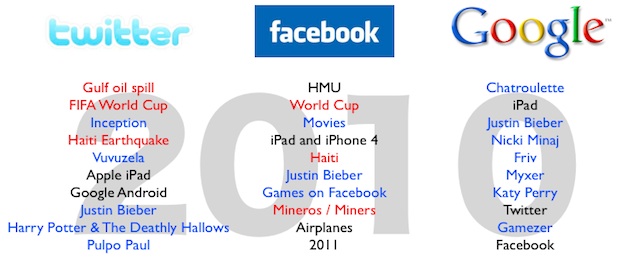BY Kit Eat
Twitter, Google and Facebook are busily revealing their top ten trends for 2010. As well as being curios in themselves, the lists reveal, in stark words, exactly what users think the purpose of each of these services is.
Twitter's list is its "Top Trends," a product of its algorithm that detects what most people are talking about on its network. Its emphasis is on hot topics that quickly rise in popularity--a good measure of how interesting something is, and an excellent way to keep Justin Bieber off the top of the list.
Facebook's "Memeology: Top Status Trends of the Year" is a more analytical affair than Twitter's. It boils down the year's billions of Facebook status trends down to a top ten list. The terms here grew fastest compared to words from 2009.
Google's Zeigeist highlights the most popular search phrases throughout 2010, in a multitude of different ways. The list we selected is the fastest-rising search trends. While the search trends don't match up exactly with the same sort of usage as people tweeting or updating their statuses on Facebook, it gives a good flavor of what the world is looking for online--and presumably then tweeting about.
The top ten lists are shown together above. Firstly they reveal that the world seems obsessed by a 16 year-old Canadian pop singer (though there's no trend for "bad haircut" that parallels Justin Bieber's presence on all three lists).
They also reveal that there's just one gadget that defines 2010 for most Netizens--Apple's iPad. This bodes well for Apple, which is likely to reveal its updated version in a few weeks.
Mentions of Google's Android smartphones, which are rapidly encroaching on the iPhone's territory, were prominent on Twitter--but not Google.
Facebook was a place where new acronyms emerged: Hit Me Up (HMU) was its most popular trend, "digital shorthand for people to ask their friends to hang out."
Missing from all lists was "WikiLeaks," which is surprising, given the fact it has dominated the news for months.
But there are three big take-aways here: Twitter is used to talk about newsy items (highlighted in red), Google is most often used for entertainment-related info (blue highlights), and Facebook was a mix of both with some oddities thrown in. This is user-determined data, rather than the purposes that the sites themselves would like you to think of when you imagine their brand.
